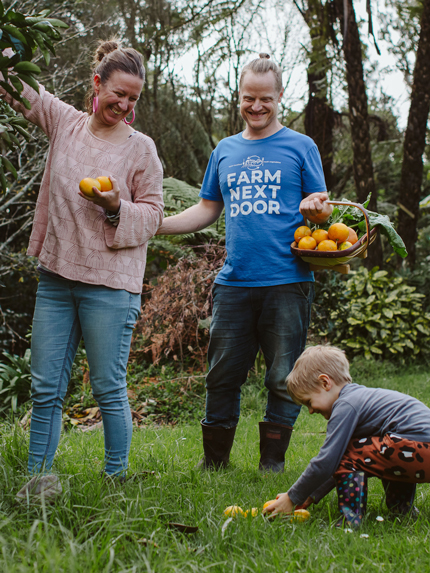Making the most of it

The traditional Kiwi dream of merely owning a quarter-acre section wasn’t enough for New Plymouth couple Carl and Kati Freeman. They had more up their sleeves.
Once settled into their new home – a former state house on the generous-sized plot – they rolled up said sleeves and transformed the section into a thriving suburban farm to provide their local community with fresh, healthy food.
“Growing food and connecting with the community through kai is a vibrant and fun part of life,” Carl says, as he and five-year-old son, River, harvest plump grapefruit from a flourishing tree on the property.
It took just two years for the land to produce more than 25 different types of fruit and vegetables that Carl now sells at a farmers’ market every weekend. In the process, he’s setting an inspirational example of what’s possible in any backyard, with productive techniques, organic inputs, creativity and a supportive community.
The hard work on the farm extends beyond Carl and Kati. There are chooks, ducks, bees, berries, mushrooms, a worm farm and composting networks all playing their part to support organic, nutrient-dense output.
Carl also distributes vege boxes in the area, and recently, he’s acquired funding for a partnership project between Farm Next Door – a network of small-scale, urban organic market gardens in central New Plymouth – and researchers and associates from Palmerston North’s Massey University.
“The research will focus on how we can create hyper-local food systems in Taranaki to replicate in other regions,” says Carl, whose experience in organic farming spans more than ten years.
He says that while River thinks it’s normal for families to grow their own produce, it’s not a reality for many children. He’s hoping that the research will extend its focus to providing healthy school lunches, with farms established near schools, giving kids access to fresh fruit and vegetables as well as an understanding of where it all comes from.
To be involved in a movement that champions a revitalised approach to how produce is grown and distributed is an exciting and rewarding journey, Carl says, particularly when there has been no real innovation around how food is grown since post-war times.
“And there’s so much potential to ensure more people are fed healthy food from healthy soils,” Carl says.
The flow-on effects are plentiful, too, ranging from better health to a more sustainable way of life and higher employment rates, Carl says.
“An American study found that local food systems employ four times more people than conventional systems like supermarkets, which, in today’s climate, is particularly important.”
And the best part? We can all contribute to the movement, no matter how big or small our footprint is.
“You don’t have to go all in and buy a lifestyle block; you can do so much in your own backyard. It’s fantastic to use compost and food scraps, or have a worm farm; that’s where the cycle of life comes from and it’s a real shame to send food to the tip,” Carl says.
Reported by Monica Tischler for our AA Directions Spring 2020 issue
